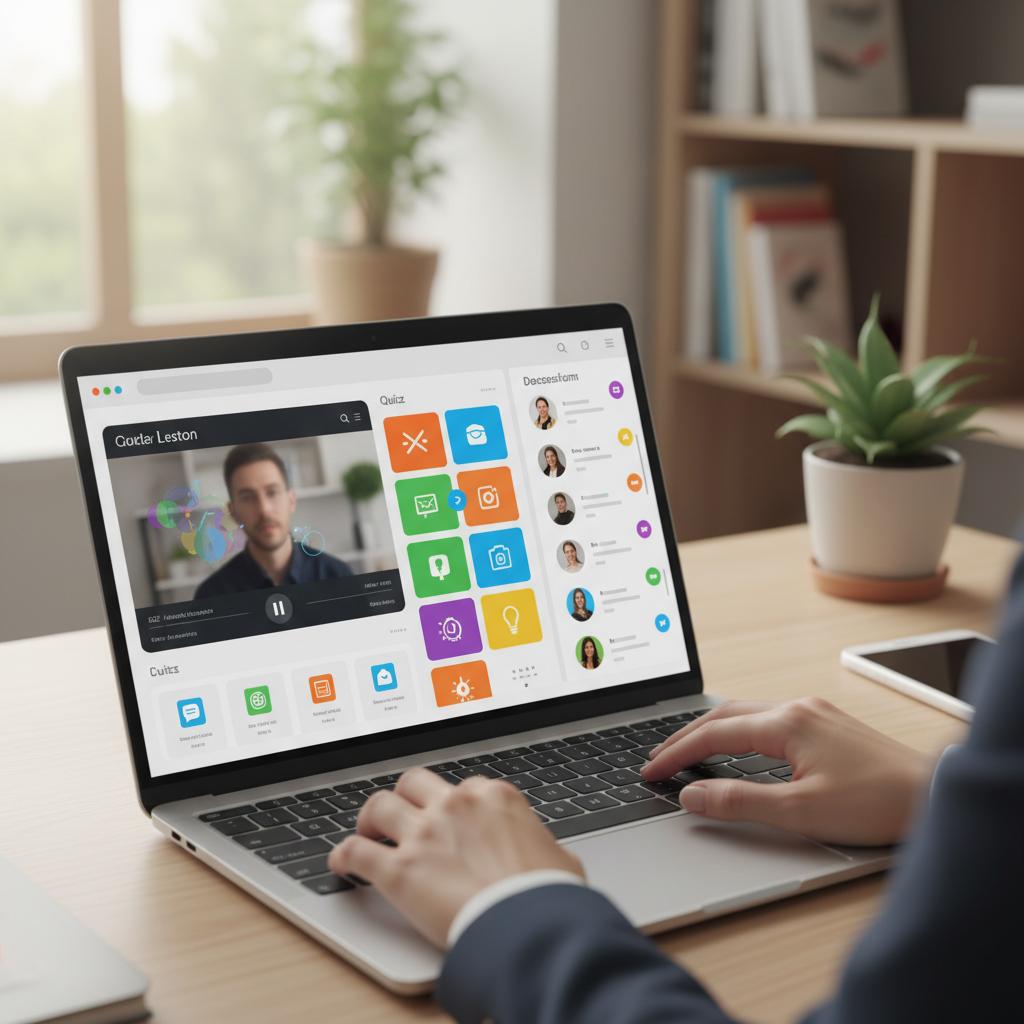
Table of Contents
Introduction
Here’s something I’ve learned: the moment you stop learning is the moment you start falling behind. And honestly? That’s never been more true than it is right now. Online courses have completely changed the game when it comes to picking up new skills and knowledge—no matter where you are in life or what your schedule looks like. Whether you’re climbing the career ladder, chasing a passion project, or just trying to keep up with how fast everything’s changing these days, online education puts incredible opportunities right at your fingertips.
Think about it—learning doesn’t end when you graduate. Your career demands it, industries shift constantly, and frankly, staying relevant means staying curious. That’s why millions of people are turning to online courses for professional development and continuing education. The numbers don’t lie either: adult enrollment in online learning keeps climbing year after year. Why? Because technology has made learning more flexible and accessible than ever before. When you understand how online courses can fuel lifelong learning, you’re essentially giving yourself permission to keep growing. And if you’re wondering about quality, checking out online degree accreditation can help you make smart choices about where to invest your time and money.
But here’s what’s really cool about lifelong learning—it’s not just about your career. It keeps your mind sharp, builds confidence, and honestly makes life more interesting. The way education technology is advancing? It’s like watching the future unfold. Interactive platforms, AI tutors, virtual reality experiences—learning has never been this engaging. If you want to see where all this is heading, diving into the latest education technology trends will blow your mind. We’re talking about tools that are completely reshaping how we learn and what’s possible in education.
There’s another piece to this puzzle that people don’t talk about enough: how learning affects your mental health. Seriously—pursuing knowledge builds resilience, keeps your brain healthy, and helps you feel more balanced overall. It’s not just about collecting certificates or adding skills to your resume. If you’re curious about this connection (and you should be), exploring resources on education and mental health reveals just how powerful learning can be for your overall well-being. It’s a reminder that investing in online courses isn’t just professional development—it’s personal development too.
What You’ll Learn in This Guide
Ready to dive into the world of online courses and lifelong learning? We’re going to cover everything you need to know—from why continuous learning matters to practical tips for choosing courses that actually deliver results. Here’s what we’ll explore together:
- The Value of Lifelong Learning: Why staying curious and continuously growing isn’t just nice to have—it’s essential for thriving in today’s world, both personally and professionally.
- Advantages of Online Courses: The real benefits that make online learning so appealing: flexibility that works with your life, accessibility that breaks down barriers, and affordability that won’t break the bank.
- Types and Formats of Online Courses: From binge-worthy video series to live interactive sessions—we’ll help you figure out which learning style matches how your brain works best.
- Choosing the Right Course: Practical strategies for spotting quality courses, setting realistic goals, and making decisions that actually pay off in the long run.
Throughout this journey, we’ll share proven strategies for staying motivated (because let’s face it, that’s often the hardest part), managing your time effectively, and tackling those frustrating moments that every online learner faces. Whether you’re completely new to online education or you’re looking to level up your approach, this guide will help you make meaningful progress toward your goals.
Coming up, we’ll get into the nitty-gritty of why online courses work so well for lifelong learners. You’ll discover the freedom of learning on your own terms—anytime, anywhere, at your own pace. We’ll break down different course formats and help you understand which ones align with your interests and career aspirations. Plus, our expert insights will give you the confidence to navigate your options and choose programs that truly match what you’re trying to achieve.
We’ll also dig into the habits that separate successful online learners from those who start strong but fizzle out. You’ll learn how to ask for help when you need it and develop the resilience to push through challenges. If your focus is specifically on advancing your career, our guide to online courses for professional development offers targeted strategies for skill-building that employers actually value. And for those looking to maintain credentials or expand their expertise, exploring online courses for continuing education provides pathways to keep your knowledge current and competitive.
So let’s get started. This complete guide to lifelong learning through online courses is designed to fuel your curiosity, boost your adaptability, and help you achieve things you might not have thought possible. The time you invest in learning today? It’s going to pay dividends tomorrow—in new skills, fresh opportunities, and accomplishments that make all the effort worthwhile.

Here’s something that’s become crystal clear: we’re living in a world where learning never really stops. And honestly? That’s exciting. Online courses have transformed from a nice-to-have into an absolute game-changer for anyone who wants to keep growing—whether you’re 25 or 65, working full-time or juggling three kids. Think about it: when was the last time traditional education worked around YOUR schedule? Online learning flips that script entirely, giving you the freedom to learn what you want, when you want, from wherever you happen to be.
Benefits of Online Courses for Lifelong Learning
Let’s get real about what makes online courses so powerful. Convenience isn’t just a nice perk—it’s everything. Picture this: you’re commuting home from work, and instead of scrolling through social media, you’re watching a lecture on data science. Or maybe you’re up late after the kids are asleep, finally diving into that photography course you’ve been putting off for months. That’s the beauty of online learning—it bends to fit your life, not the other way around.
But here’s what really gets me excited: the sheer variety. Want to learn about ancient Roman history? There’s a course for that. Curious about cryptocurrency? Yep, covered. Dreaming of finally understanding how to code? You’ve got options—lots of them. This isn’t your grandfather’s education system where you had to choose from whatever was offered at the local community college (though shout-out to community colleges—they’re awesome too).
Now, let’s talk money. Traditional education can cost a fortune—we’re talking tuition, textbooks, parking fees, that overpriced campus coffee. Online courses? They’ve basically democratized learning. You can find incredible free courses or pay a fraction of what you’d spend on a single college class. And those certificates you earn? They’re not just digital trophies—employers actually recognize them. Your resume gets a boost, and you get the satisfaction of knowing you’ve genuinely learned something valuable. If you’re curious about the tech side of how all this works, checking out learning management systems gives you a peek behind the curtain at how these courses actually get delivered to your screen.
Key Advantages
Let me break down what makes online learning so compelling:
- Learn at your own pace from anywhere: Seriously, anywhere. Your couch, a coffee shop in Prague, your lunch break at work—you’re in control of the when and where.
- Access to diverse subjects and expert instructors: We’re talking about learning from people who literally wrote the book on their subject. Industry leaders, university professors, successful entrepreneurs—they’re all just a click away.
- Cost-effective compared to traditional education: Your wallet will thank you. No student loans for a single course, no expensive textbooks that become paperweights after one semester.
- Opportunities for certification and skill enhancement: These aren’t participation trophies—they’re legitimate credentials that show you’ve put in the work and mastered new skills.
The key insight here? Education doesn’t have to be this massive, disruptive life event anymore. It can be woven into your daily routine, supporting your goals and interests as they evolve. That’s pretty revolutionary when you think about it.
So we’ve covered why online learning rocks—but what exactly can you learn? Spoiler alert: pretty much anything you can imagine.
Popular Types of Online Courses for Lifelong Learning
The online course landscape is like a massive buffet—there’s something for every taste, learning style, and schedule. Some people love binge-watching video lessons at 2x speed (you know who you are), while others need the energy of live interaction to stay engaged. The good news? Online platforms have figured out how to serve both types of learners, and everyone in between.
What’s really impressive is how course creators have managed to cover virtually every subject under the sun. Whether you’re looking to advance your career, explore a hobby, or just satisfy your curiosity about something completely random, there’s probably a course waiting for you. The challenge isn’t finding something to learn—it’s choosing from the overwhelming number of options.
One thing to keep in mind: not all courses are created equal. If you’re planning to earn credentials that matter to employers or academic institutions, you’ll want to understand how accreditation works. Resources like online degree accreditation guides can help you separate the legitimate programs from the questionable ones.
Course Formats
Here’s how online courses typically work—and trust me, there’s probably a format that matches exactly how you like to learn:
- Self-paced video lessons: The classic format that started it all. Watch, pause, rewind, take notes, watch again—it’s like having a personal tutor who never gets impatient with your questions.
- Live webinars and workshops: For those who thrive on real-time interaction and the energy of being part of something happening right now. Plus, you can ask questions and get immediate answers.
- Interactive quizzes and assignments: Because let’s face it—passive learning only goes so far. These keep you engaged and help you actually retain what you’re learning.
- Discussion forums and peer interactions: Sometimes the best insights come from fellow students who are wrestling with the same concepts. It’s like having a study group that never has to agree on when to meet.
Subject Areas
Ready for the fun part? Here’s what you can actually learn online these days:
- Technology and coding: From basic HTML to artificial intelligence—if it involves computers, there’s probably a course for it. These skills aren’t just nice-to-have anymore; they’re becoming essential across industries.
- Health and wellness: Everything from nutrition science to meditation techniques. Because taking care of yourself is the best investment you can make.
- Arts and humanities: Creative writing, art history, philosophy—the subjects that feed your soul and help you see the world differently.
- Business and management: Whether you’re climbing the corporate ladder or starting your own venture, these courses cover everything from basic project management to advanced entrepreneurship strategies. Speaking of business innovation, exploring advantages of cloud computing in business shows how modern companies are staying competitive.
- Language learning: Finally tackle that language you’ve always wanted to speak. Pro tip: online language courses have gotten incredibly sophisticated—some even use AI to personalize your learning experience.

So here we are—you’ve just discovered how online courses can completely change your approach to learning. And honestly? It’s pretty exciting when you think about it. We live in a world where you can pick up new skills from your couch, during your lunch break, or even while traveling. The flexibility is real, and it works for everyone—whether you’re a busy parent, a career-changer, or someone who just loves learning new things. You’ve got options: binge-watch video lessons, join live sessions with experts, or tackle interactive projects. From coding and business strategy to art and wellness, there’s literally something for everyone. Plus, let’s talk about cost—online courses won’t drain your bank account like traditional education might, and you can actually earn certificates that employers recognize.
But here’s the thing about succeeding with online learning (and this is important): you need a game plan. Set clear goals—what exactly do you want to achieve? Do your homework on course quality before diving in. Create a learning space that actually works for you, stick to a schedule that fits your life, and don’t just passively watch videos—engage with the material. Take notes, ask questions, find extra resources when you need them. And when you hit a wall? Whether it’s confusing content, tech troubles, or just feeling unmotivated—reach out for help. There’s no shame in that game. The payoff is huge: you’ll keep your mind sharp, build confidence, and discover things that genuinely enrich your life. This isn’t just about advancing your career (though it definitely helps with that too).
Ready to take this further? Good, because we’ve got some resources that’ll help you make the most of your learning journey. If you want to understand how the tech side works, check out our guide on learning management systems—it breaks down how these platforms actually help you learn better. Looking to level up professionally? Our comprehensive look at online courses for professional development has you covered with courses that match what employers actually want right now. Need to maintain certifications or go deeper in your field? You’ll want to explore online courses for continuing education for expert guidance. And if you’re curious about what’s coming next in educational technology, our piece on education technology trends will give you a glimpse into some pretty cool innovations.
Here’s what I want you to remember: committing to lifelong learning gives you superpowers. Seriously. You become adaptable, confident, and ready for whatever comes next. Sure, there will be moments when you struggle with a concept or feel overwhelmed—that’s totally normal. The key is staying curious and being patient with yourself. Keep moving forward, even if it’s just baby steps. Your future self is going to be so grateful you started this journey. And if you need a little extra motivation along the way, our resource on online courses for professional development has practical tips to help you get the most out of every lesson. So go ahead—dive in. Your learning adventure starts now.
Frequently Asked Questions
-
What are the best platforms for online lifelong learning?
- Popular platforms include Coursera, Udemy, edX, and LinkedIn Learning based on course variety and quality.
-
Are online courses effective for all age groups?
- Yes, they are designed to be flexible and accessible for learners of all ages and backgrounds.
-
Can I get certifications through online courses?
- Many courses offer certificates of completion which can enhance resumes and career prospects.
-
How much time should I dedicate to online courses?
- Time commitment varies by course, but setting a consistent schedule helps manage learning effectively.
-
What if I struggle with motivation while learning online?
- Using study groups, setting goals, and seeking support can improve motivation and learning outcomes.
